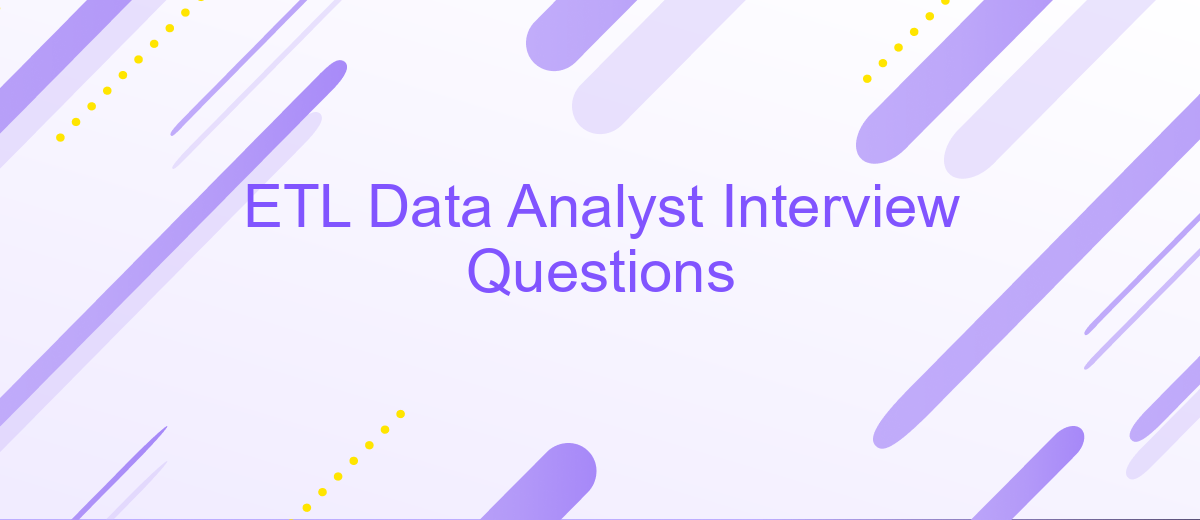ETL Data Analyst Interview Questions
Preparing for an ETL Data Analyst interview can be a daunting task, but understanding the key questions and topics can make all the difference. This article provides a comprehensive list of common interview questions, covering everything from technical skills to problem-solving abilities. Whether you're a seasoned professional or a newcomer, these insights will help you confidently tackle your next interview.
Introduction
ETL (Extract, Transform, Load) processes are critical for data analysis and business intelligence, making the role of an ETL Data Analyst highly significant. Preparing for an ETL Data Analyst interview involves understanding various tools, methodologies, and best practices in data management and analysis.
- Key concepts in ETL processes
- Common ETL tools and technologies
- Data transformation techniques
- Best practices in data integration
- Real-world scenarios and problem-solving skills
In addition to technical knowledge, familiarity with integration services like ApiX-Drive can be beneficial. ApiX-Drive simplifies the process of connecting different applications and automating data workflows, which is essential for efficient ETL operations. Understanding these aspects will help you excel in your ETL Data Analyst interview and demonstrate your capability to handle complex data integration tasks.
Technical Questions

When interviewing for an ETL Data Analyst position, you can expect questions about data transformation processes, data warehousing, and ETL tools. Be prepared to explain how you would extract data from various sources, transform it according to business requirements, and load it into a destination system. You might be asked to describe your experience with specific ETL tools like Apache NiFi, Talend, or Informatica, and how you have used them to streamline data workflows.
Another important area is data integration. You may need to discuss how you handle data from disparate systems and ensure seamless integration. Tools like ApiX-Drive can be invaluable in automating data transfers and integrations between different platforms. You should be ready to explain how you have configured such integrations in your previous roles, ensuring data accuracy and consistency. Understanding APIs and how to leverage them for data integration will also be crucial in demonstrating your technical expertise.
Behavioral Questions

Behavioral questions help interviewers understand how you handle various situations in the workplace, especially those related to teamwork, problem-solving, and adaptability. These questions are designed to gauge your interpersonal skills and how you apply your technical knowledge in real-world scenarios.
- Describe a time when you had to work closely with a team to complete a complex data project. What was your role, and how did you ensure effective collaboration?
- Can you provide an example of a challenging data integration project you managed? How did you approach the problem, and what tools or services, such as ApiX-Drive, did you use to streamline the process?
- Tell me about a situation where you had to adapt quickly to changes in project requirements or data sources. How did you manage the transition and ensure the project's success?
Answering these questions effectively requires you to highlight your ability to work well with others, your problem-solving skills, and your adaptability to changing circumstances. Mentioning specific tools like ApiX-Drive can demonstrate your familiarity with industry-standard solutions for data integration and workflow automation.
Case Study Questions

When interviewing for an ETL Data Analyst position, candidates may be presented with case study questions to assess their problem-solving skills and practical knowledge. These questions often simulate real-world scenarios, requiring candidates to demonstrate their ability to design and implement effective ETL processes.
For example, you may be asked to design an ETL pipeline for a retail company that needs to integrate data from multiple sources, such as sales databases, customer relationship management (CRM) systems, and online transaction platforms. You will need to explain how you would extract, transform, and load this data into a centralized data warehouse.
- How would you handle data quality issues during the ETL process?
- What strategies would you use to optimize ETL performance?
- How would you ensure data security and compliance with regulations?
- Can you describe a time when you used a tool like ApiX-Drive for data integration?
These case study questions are designed to evaluate your technical expertise, attention to detail, and ability to think critically under pressure. Preparing detailed responses and drawing on past experiences can help you stand out in the interview process.
Closing Questions
As we wrap up our interview, do you have any questions for us about the role or the team? It's always insightful to hear what piques your interest and to address any curiosities you might have about our processes, tools, or company culture. We value open communication and are eager to provide you with a comprehensive understanding of what it's like to work here.
Additionally, how do you stay updated with the latest trends and technologies in data analytics and ETL processes? Continuous learning is crucial in our field, and we encourage our team members to engage with new tools and methodologies. For instance, have you had any experience with integration platforms like ApiX-Drive, which can streamline data workflows and enhance efficiency? Your approach to professional development is something we highly regard and look forward to discussing further.
FAQ
What is ETL and why is it important in data analysis?
What are the key components of an ETL process?
How do you handle data quality issues during the ETL process?
Can you explain the difference between ETL and ELT?
What are some common challenges faced during the ETL process and how do you overcome them?
Apix-Drive will help optimize business processes, save you from a lot of routine tasks and unnecessary costs for automation, attracting additional specialists. Try setting up a free test connection with ApiX-Drive and see for yourself. Now you have to think about where to invest the freed time and money!

